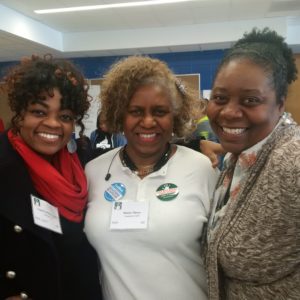• by Aurelio M. Montemayor, M.Ed. • IDRA Newsletter • January 2017 •


In the states served by the IDRA EAC-South (one of four national equity assistance centers), from Texas to Florida and Washington, D.C., communities and schools are working toward improvement. Following are examples of parents and communities in Louisiana, Georgia, Arkansas, Mississippi and Texas who are taking action.
Louisiana – Community-Schools Approach
The Louisiana Alliance to Reclaim Our Schools promotes the idea of community schools over the more drastic step of turning over underperforming schools to charter operators that are privately run. The community-schools approach involves getting parents and other community members more involved in schoolhouse decision making, as well as bulking up services like mental health care and tutoring (Vanacore, 2016). They are ensuring that their public schools stay public and that the community voice is heard. They also are part of the national Reclaim Our Schools effort. (Follow them on Twitter @ReclaimOurSchls or online).
Georgia – Dismantling the School-to-Prison Pipeline


[l-r] Toyasha Vaughn, Marlyn Tillman and Hope Darden-Swift. Ms. Tillman is co-founder and executive director of Gwinnett SToPP. Ms. Vaughn and Ms. Darden-Swift are graduates of its parent leadership institute.
In Gwinnett, Georgia, Marlyn Tillman’s 15-year-old son was suspended from school for what turned out to be minor infractions. She challenged the school for its harsh punishment. After some persistence, they determined her son’s behavior was due to his attention deficit hyperactivity disorder (ADHD). With appropriate support, he became an honor student in high school excelling in International Baccalaureate classes.
Ms. Tillman organized a group of parents who were having similar problems with their schools’ discipline practices. When she first started investigating the issue, anecdotal data pointed to punitive and excessive punishments, especially of students who were Black males and those who had special needs. Over time, the families collected enough data to document a pattern of excessive punishment of students of color. Black boys with special needs were the most vulnerable to disciplinary actions that were sending them to alternative schools and eventually pushing them out of the school system. White students with special needs were affected as well.
The families focused on the alternative disciplinary campuses. They discovered that instruction was minimal and that students were encouraged to do as they pleased as long as they did not cause problems. Some schools had not even been serving breakfast. The parents knew this was not the education their children needed and deserved. They succeeded in making sure that the minimum Georgia facility requirements for a school were being met. Today, the families continue to review the data of the juvenile justice system to track the flow of students into the justice system.
Ms. Tillman is the co-founder and executive director of Gwinnett Parent Coalition to Dismantle the School-to-Prison Pipeline (Gwinnett SToPP). She stated: “Parent organizing is ensuring that those who are impacted are at the table. It is bringing parents to the table to do what we do best, which is to guide the instruction of our children, to guide the environment of our children, and ensure that they, our children, get the best possible educational outcomes.”
Gwinnett SToPP seeks to build and strengthen relationships within the community through public awareness, empowerment and advocacy. Its first goal is to increase public awareness of the injustice that many children face within the educational system as it relates to the school-to-prison pipeline and the judicial process. Members also document family stories – “100 Stories in 100 Days” – about the challenges their children face in schools. A third major effort is the Parent Leadership Institute (PLI), an innovative project with a parent focus, pairing grassroots leadership training with school advocacy training. More information is online).
Arkansas – Putting the Public Back into Public Policy
The Arkansas Public Policy Panel (APPP) continues a long history of advocacy begun in 1963. Its current executive director, Bill Kopsky, says, “Leadership means leadership with other people. We reject a single leader model… One of the strengths of our organization is that we bring people together across the races, across the geography and across a lot of issue barriers, and [we] develop a common agenda for what moves Arkansas forward” (2014).
APPP is a statewide organization dedicated to achieving social and economic justice by organizing citizen groups around the state, educating and supporting them to be more effective and powerful, and linking them with one another. Its newsletter, Public Policy Watch, highlights one recent advocacy effort: “The stories of families in Arkansas’ special education programs are often heartbreaking, but they are also playing a part in improving the system… The parents’ testimony highlighted the disconnect between the policies in place and what’s actually being implemented. On paper, the state is complying with federal regulations for special education, but student outcomes say otherwise. ‘The taskforce really needed parents’ perspectives,’ said the Panel’s Education Organizer Ana Phakhin. Phakhin said the testimony heavily influenced the taskforce recommendations.” (APPP, 2016)
These dedicated parents and communities have had a direct impact on local and state education policies and practices in Arkansas. Special education, for example, has become much more sensitive to serve children with special needs.
Mississippi – Bringing Together Families in the Lowest Wealth Communities
The Citizens for a Better Greenville (CBG) was formed in the Delta’s largest city, Greenville, which sits on the edge of the Mississippi River and with a population of 46,000 that is almost 70 percent Black. CBG focuses its organizing work in the lowest wealth communities in the city. “You get them engaged by going to those impacted by the problem,” said Joyce Parker (2013). CBG has successfully engaged the community to elect accountable officials to the city council. They have, in turn, appointed members to the city school board. In addition, CBG works with youth and school administrators to set up an innovative conflict resolution program that is run by students in the high school.
CBG is part of the Mississippi Delta Catalyst Roundtable, a group of 10 “Black-based, Black-led community organizations working in the Delta that have formed a partnership of parents, students, educators and public officials to create a quality public education accessible to all children.” Learn more online.
Texas – Family Leadership for Excellent Education
Some years ago when the Texas legislature dramatically reduced the funding of schools, many communities united in protest and in the next legislative round, a portion of the money was replaced. Then, in the spring of 2015, a network of community organizations and Comunitarios that IDRA had been working with conducted a community survey of 1,600 families across two counties and 10 school districts to find out what they knew about changes in graduation requirements. The resulting report was shared with community members in a Mesa Comunitaria event (community roundtable) (IDRA, 2016). This was followed up by various local projects to assure that communities were informed and their children were on college tracks, as they wanted and hoped for. (Cortez, 2015)
The community collected its own information, made sense of it and took clear action. Now, most of the school districts involved have improved their communication with their families, and local family leadership in education projects – which include youth leadership – are ongoing.
In Alamo, Texas, in March of 2017, families will hold a session at a middle school to inform other families through the presentation by students of the benefits of dual credit courses, K-12 biliteracy, dropout recovery to complete high school and begin college, and adult education. This is replicating a similar event held by families last year in Pharr, Texas, to close to 200 participants. This year they expect to have at least 300.
Their impact in South Texas has included:
- The school districts are acknowledging that families want their children prepared for college and taking steps in that direction.
- School districts have improved their communication with colonia parents about graduation requirements and have improved how they are informing families about the college track for their children.
- All the targeted districts now accept representatives from the Comunitarios as peers and partners in co-planning for excellent schools for all children.
As in South Texas, San Antonio families are forming new groups whose process is family leadership in education, and their mission is to transform schools. They partner with their schools to improve policy and practice and to apply the research they conduct on the status and conditions of their schools.
Education CAFÉ (Community Action Forums for Excellence)
The next generation of IDRA’s family leadership in education model is the Education CAFÉ. Formerly known as PTA Comunitario, the Education CAFÉ approach is still designed to transform the traditional model of parent school organizations into a more effective vehicle for parents who have previously been excluded or underserved to participate and influence their schools. The new name emphasizes the diversity of communities who are engaged in impacting their public schools. This parent-led approach creates a partnership between families and schools in support of children’s academic and social success.
The key activity of Education CAFÉ members is to lead education projects designed to improve their schools. These projects are based on and flow from actionable knowledge. IDRA’s Quality Schools Action Framework highlights actionable knowledge as central to the levers of change for equitable and excellent schools. Eight groups exist in the lower Rio Grande Valley in south Texas and have had significant impacts (such as those described above), and more are in development. The Education CAFÉ network is currently expanding and is scaling up from south Texas Comunitarios to other parts of the state and eventually to the IDRA EAC-South region and across the country.
Whether its guaranteeing students are prepared for college, changing oppressive discipline practices, stopping bullying, or keeping public schools public, communities and schools face big challenges. Engaged citizens, holding educational leadership accountable and informing enlightened public policy, are transforming their public schools.
Resources
Arkansas Public Policy Panel. (Summer 2016). “Parent Testimony Influences Special Education Report,” Public Policy Watch (Little Rock, Ark.: APPP).
Cortez, J.D. (June-July 2015) “¿Y Ahora Qué? And Now What? – Community Groups in South Texas Work Together to Improve Education,” IDRA Newsletter (San Antonio, Texas: Intercultural Development Research Association).
IDRA. (2016). Our Mesa Comunitaria – One Year Later (San Antonio, Texas: Intercultural Development Research Association).
Kopsky, B. (October 7, 2014). “Forty Years, Forty Leaders for Arkansas,” video (Little Rock, Ark.: Winthrop Rockefeller Foundation).
Parker, J. (May 24, 2013). “Is Education the Civil Rights Issue of Today,” video (Atlanta, Ga.: Southern Education Foundation).
Vanacore, A. (November 21, 2016). “Charter School Critics in Louisiana Form New Coalition, Draw Fire for Secrecy,” The New Orleans Advocate.
Aurelio M. Montemayor, M.Ed., is an IDRA senior education associate. Comments and questions may be directed to him via email at aurelio.montemayor@idra.org. Special thanks to the Southern Education Foundation for its assistance with this article.
[©2017, IDRA. This article originally appeared in the January 2017 IDRA Newsletter by the Intercultural Development Research Association. Permission to reproduce this article is granted provided the article is reprinted in its entirety and proper credit is given to IDRA and the author.]


